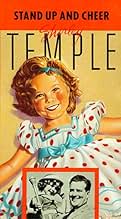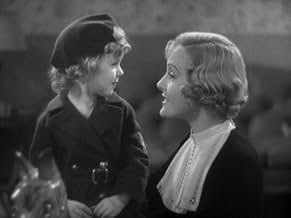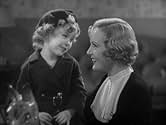अपनी भाषा में प्लॉट जोड़ेंA little girl's (Shirley Temple) toe-tapping musical numbers uplift the nation during the Depression in this charming classic that includes Temple's rendition of "Baby Take a Bow.A little girl's (Shirley Temple) toe-tapping musical numbers uplift the nation during the Depression in this charming classic that includes Temple's rendition of "Baby Take a Bow.A little girl's (Shirley Temple) toe-tapping musical numbers uplift the nation during the Depression in this charming classic that includes Temple's rendition of "Baby Take a Bow.
- पुरस्कार
- कुल 2 जीत
- Aunt Jemima
- (as 'Aunt Jemima')
- Senator Danforth
- (as Mitchell)
- Senator Short
- (as Durant)
- Nick Foran
- (as Nick Foran)
- Hill-Billy
- (as 'Skins' Miller)
- Dancer
- (बिना क्रेडिट के)
- Dancer
- (बिना क्रेडिट के)
फ़ीचर्ड समीक्षाएं
The script is a mess, the editing is downright atrocious, the performances are flat, and nothing to keep your eyes open happens until Shirley bursts upon the screen with James Dunn and chorines in one of her most charming song-and-dance routines.
Believe me, the rest is worthless as entertainment and not even satisfying as a curiosity piece of the Depression era.
Let's face it. Shirley Temple became a star despite this mess of a movie and all because of one great number.
As for Stepin Fetchit, he is marvelous!!! The man was a comic genius. I rate him as good as Stan Laurel. People nowadays keep stressing the stereotypes of minorities in old films. That's true, but even so, actors like Fetchit displayed great talent. And didn't most comedians, of any color, play stereotypical roles? Silliness has always been a source of comedy, whether it was performed by Stepin Fetchit, Stan Laurel, Cary Grant, or Willie Fung.
I love the musical numbers! They are upbeat, and happy. my favorite one is not Baby, Take A Bow, but Broadway's Gone Hillbilly. I think that The Picken Sisters sing in this number, although they are not listed in the cast.
Take, for example, the show-stopping finale to "I'm Laughing," performed by Tess Gardella. There are a series of tableaux in this number, of various individuals all representing different marginalized groups: Immigrants, sweatshop workers, laborers of all kinds, all leading up to Tess Gardella herself busting out with the biggest, cheeriest performance of all, surrounded by a rousing, dancing chorus. It was clearly meant to recap the song's theme--if I can laugh, as downtrodden as I am, so can you--and to embody those who persevere and triumph over circumstance. With a swish of her ample hips and a gleam in her eye, Ms. Gardella triumphs.
The standard Stepin Fetchit routine has been analyzed everywhere, but let me just add that in this picture, the actor personifies African American resistance. In 1934 Black men were still not free from the vicious system of racial etiquette known as Jim Crow, and were therefore limited in the number of personae they were allowed to display. The genius of Stepin Fetchit is that he acts out the prescribed social role while frustrating those who prescribe it by withholding his intelligence and personality from the social interaction altogether. He slyly gives white people exactly what they demand,nothing more, forcing them to realize that perhaps that's not what they want after all. The resistance is his and the joke is on them.
Warner Baxter had the main role as "Lawrence Cromwell." He was assisted by his secretary played by a very pretty Madge Evans, whom I didn't know until trying to find out on this website because the video box doesn't even have her listed in the billing.
The rest of the cast included a couple of people I was familiar with from other roles, such as Nigel Bruce, who played Dr. Watson to Basil Rathbone's Sherlock Holmes. We also have a lady who played Aunt Jemima and Stepin Fetchit, both a couple of embarrassing stereotypes of the period. I was never a fan of Fetchin, not for PC reasons but simply because of his whiny voice and stupid characters he played. He was the same here except when he dove into a fish tank, which made gave me a big laugh.
This film had a good share of strange characters but, despite that, overall isn't anything that memorable....perhaps because Shirley had such a small role.
क्या आपको पता है
- ट्रिवियाFor the "Baby, Take a Bow" number with James Dunn, the studio felt it would be easier for Shirley Temple to do the dance she had done at her audition rather than learn a new one, so Temple spent her first day on the set giving Dunn dancing lessons.
- भाव
Lawrence Cromwell: Now, Miss Monroe...
Mary Adams: Er, Adams.
Lawrence Cromwell: Oh, yes, step here a minute, will you, please... something I want to show you. There's one phase in this amusement campaign which I think you ought to understand. The zones in...
[overcome by her good looks, he stops]
Lawrence Cromwell: You're beautiful.
Mary Adams: Ah, of course I'm not.
Lawrence Cromwell: What's that?
Mary Adams: I said I'm not beautiful.
Lawrence Cromwell: Young woman, you're talking to Lawrence Cromwell... Lawrence Cromwell, the world's recognized authority on feminine beauty and charm. Do you mean to stand there and question my judgment on the subject of beauty? Do you? Do you?
Mary Adams: Oh, no, no, I wasn't...
Lawrence Cromwell: Oh, but you DID question it. Now, you listen to me: when Lawrence Cromwell says a girl's beautiful, she's BEAUTIFUL, do you understand? Ha, the very idea! I demand an apology. Your personality definitely puts you in Class 10-A, Department B, with a double-X rating in my card index system. And, my system is the pre-eminent beauty catalogue of today.
[sizing her up at a glance]
Lawrence Cromwell: Height, 5 foot 4... weight, 116... bust, 34... waist, 26... hips, 36... calf, 12 and 1/2... ankle, 7. Questioning my judgement! Ha, ha, that is good.
Mary Adams: I'm really awfully sorry, Mr. Cromwell.
Lawrence Cromwell: Never mind, never mind, just... just let it be a lesson to you.
- इसके अलावा अन्य वर्जनDifferent versions of this film exist, with various running times between 68 and 81 minutes. Some prints have deleted demeaning & outdated cultural depictions of African Americans that are offensive to modern audiences, including scenes with _Stepin Fetchit_ and _Tess Gardella_ in blackface as "Aunt Jemima".
- कनेक्शनFeatured in Young People (1940)
- साउंडट्रैकStand Up And Cheer!
(1934) (uncredited)
Lyrics and Music by Lew Brown and Harry Akst
Sung by over the end credits
Instrumental over the title sequence and beginning credits
c. 1934 Movietone Music Corportation
टॉप पसंद
- How long is Stand Up and Cheer!?Alexa द्वारा संचालित
विवरण
- रिलीज़ की तारीख़
- कंट्री ऑफ़ ओरिजिन
- भाषा
- इस रूप में भी जाना जाता है
- Fox Movietone Follies of 1934
- उत्पादन कंपनी
- IMDbPro पर और कंपनी क्रेडिट देखें
- चलने की अवधि
- 1 घं 8 मि(68 min)
- रंग
- पक्ष अनुपात
- 1.37 : 1



































